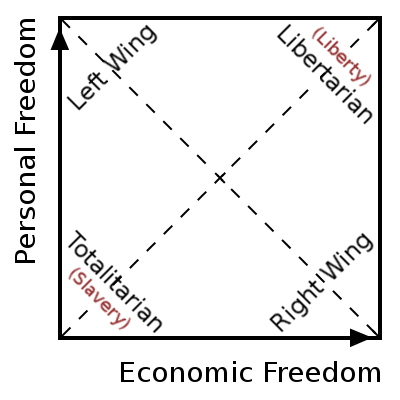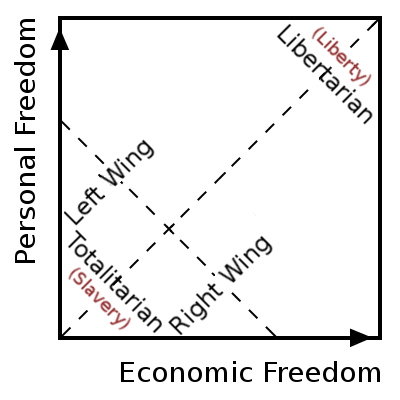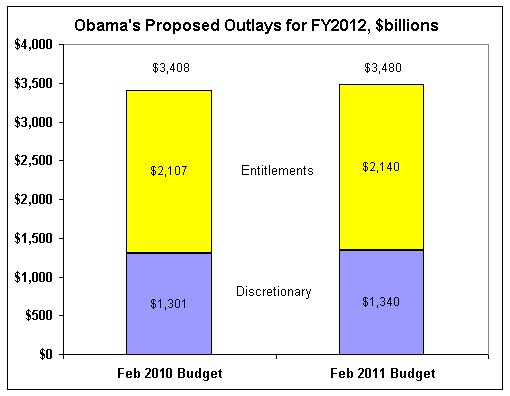Article Archives by Subject: Individualism
 John R. Schindler
John R. Schindler
|
Subject: Fighting the Wrong Battles
A friend brought a recent blog post to my attention titled, Ideology is Making America Stupid. Written by John R. Schindler, a professor of national security affairs at the U.S. Naval War College, it argues that those on both the political left and right engage in pressing their personal ideologies — a process that he characterizes as: "the substitution of preset cliches over actual thought." Well, that statement gave me pause, as this is certainly not what ideology means to me. So off to the dictionaries I went. The Merriam-Webster online dictionary states:
For a rational individual, aspects of all three definitions describe what a personal ideology consists of and how it properly functions, being a systematic (i.e., integrated) body of knowledge used to guide one's thinking in relation to society, culture and sociopolitical ends. In other words, a rational ideology is merely a subset of a broader rational philosophy of life. However, this does not correspond to Schindler's usage. Further investigation at the online Dictionary.com yields this:
This less flattering definition seems closer to the author's meaning, where systematized knowledge is replaced by adherence to doctrine, myth and belief — what I would call a pseudo-ideology. And yes, it is easy to look around and find people who come to the majority of their positions through a process of osmosis devoid of any meaningful critical analysis. The ideology of a rational person is fact-based and always open to revision in light of new evidence. But for the person holding a pseudo-ideology, adherence to their world view is a precarious necessity since their unexamined identity has become equivalent to the ideology they have adopted. To change the latter would be to lose oneself — and people will fight tooth and nail to maintain their self-image. So when the author comments:
Given the second set of definitions, there is no reason to disagree. Schindler goes on to discuss U.S. foreign policy, but concludes:
But what about the more rational meaning of ideology? Even if the average American implicitly operates more on whim than reason, this is not an excuse to abandon the pursuit of a reality-based philosophy as a guide for one's actions. Dealing with issues in isolation (i.e., in an unintegrated manner) is extremely dangerous and is probably the single greatest cause for the world's troubles. To properly address most national or global issues, a well integrated and rational perspective is a necessity. Let's be careful not to abandon the very real need for a properly based ideological framework as we go about exposing pseudo-ideologies for what they are. As I was reading this article, another thought struck me regarding the author's identification of the differences in ideologies. I realized that a great majority of the debate occurring in this country takes place over polarizing issues between left and right. Whether we are discussing abortion, the death penalty, gay rights, property rights, guns, social equality, taxes, the environment, health care, entitlements, wealth redistribution, foreign aid, privacy, etc., the focus is usually centered around pragmatic, concrete concerns. Yet, something important is usually missing, just as it is missing from the discussion in Schindler's piece. Regardless of one's position on any of these specific issues, there is another underlying struggle running orthogonal to them all — the fight for individual freedom versus collective totalitarianism. In other words, the battle for liberty. I was immediately reminded of the chart that David Nolan constructed back in 1969 (left below), which integrates a perspective on both economic and personal freedom. This chart clearly demonstrates how the classical left-right tug-of-war has little to do with advancing towards greater freedom and, in fact, shows how focusing too much on standard political left-right issues can blind us to movement in the opposing direction. In 1969, it was commonly understood that the conservative Republicans were, in general, strong supporters of economic freedom while the liberal Democrats advocated for personal self-expression and choice. However, over the past four decades, the left-wing and right-wing designations have each shifted significantly towards the lower-left, moving ever closer towards the totalitarian position, as depicted in the revised chart to the right. Recent history shows that while people argue over their pet political left-right issues until each of them is ultimately decided, regardless of whether the specific outcomes are judged favorably or not, the bitter reality is that personal liberty is almost always further curtailed in the process. What becomes clear is that, in many cases, we are wasting precious resources and valuable time fighting the wrong battles. Of course, this is not to say that there are not important aspects affecting our liberty contained in every one of the left-right issues. The point is that while we focus on whether or not birth control should be mandated, or whether tax dollars should be used to bail out car companies, or whether common core is a good educational approach, or whether certain people should be allowed to marry, we are not directly focusing on our personal freedom. Why? Because personal freedom means autonomy and the ability to exercise control over one's own life. It means that the above questions, and many like them, are ones asked and answered in the privacy of one's own mind and are not subject to external debate, let alone government control. By engaging in these debates, we implicitly grant that the answers are up to others to decide for us. What we must do is stop looking to our left or right and instead look forward towards our goal located in the upper-right corner of the chart. We need to stop playing the politicians' game where they are the ones allowed to define the issues. Instead, we must adopt the other axis and reframe the debate in clear liberty-versus-slavery terms, making the choice clear through our own examples. It is time to set rather than follow the agenda. In other words, it is time to directly assert our liberty ideology in uncompromising terms. |
 Melissa Harris-Perry
Melissa Harris-Perry
|
Subject: Whose Life Is It Anyway?
The provocative movie, Whose Life I It Anyway?, was released in 1981. It stars Richard Dreyfuss as Ken Harrison, a sculptor who is paralyzed from the neck down after a horrible automobile accident. When it becomes clear that he will never recover any additional use of his body and that his life is reduced to nothing more than the care that is offered by others, Harrison decides to end his life. However his wishes are blocked by those opposed to euthanasia and suicide. The story depicts the struggle between two views of life and confronts the question of whether Harrison—or any of us—are truly the ultimate masters of our fate, holding an absolute right to direct and dispose of our own life as we see fit? Many other films such as The Truman Show, The Matrix or Dead Poets Society explore the question of the level of control that we actually exercise over our own lives, but none is so explicit as Whose Life Is It Anyway? In each of these stories, the underlying conflict is that of individualism versus collectivism: Do we, as individuals, possess the exclusive sovereign right to determine the course of our life, or are we in some way subservient to a collective group which holds sway over us and may dictate requirements and actions that must be obeyed, even if they violate our desires and will? To state the issue plainly, the simple question is, "are we free or are we slaves?" This country was founded on the enlightenment principle of individualism. The Declaration of Independence states in no uncertain terms that each person possesses rights, and that "among these are Life, Liberty and the pursuit of Happiness." And not only do we possess these (and other) rights, but they are "unalienable", meaning that they are an inherent, absolute and unassailable part of our nature as individual human beings. Nothing could be made clearer, and yet, as time has passed, fewer and fewer people in this country understand and adhere to these fundamental truths. Bit by bit, the age old principles of collectivism have reasserted themselves and are now poised to destroy the essence of what has made America unique in the history of the world. It was not so long ago that statists had to make an effort to disguise their underlying principles and endevour to sneak them in beneath the conscious awareness of a public that still retained an American sense of life — by which I mean a respect for the virtues of self-motivation and self-responsibility, a belief that hard work was the source of reward and advancement, and an expectation that everyone was entitled to keep and dispose of that which they earned. However, six terms of Clinton, Bush and Obama, coupled with another two generations having been indoctrinated in government schools, has transformed the values of our society such that the cockroaches may now skitter about in the bright daylight without fear, openly spouting their collectivist goals. For example, here is Melissa Harris-Perry in a promotional spot for MSNBC, waxing on about a few collectivist notions which are to her, apparently, self-evident.
Wait! What was that? Could you please run that by me again.....
Ten years ago, would anyone on a major network have dared speak these words and then expected to retain their job? What a difference a decade makes. When conservatives argue that the institution of family is under attack, you have to look no further than Melissa Harris-Perry to see that it's true. And there's no longer any need for subterfuge. It's collectivism brothers and sisters, and we're proud of it! The state reigns supreme and individuals—whether adult or child—belong to us, to do with as we please. Well, there was justifiable blowback from all quarters once word concerning this piece made the rounds, and Harris-Perry was forced to respond.
While there were a few patently disingenuous attempts to misrepresent some of the source of outrage being directed at her video, on balance I thought that Harris-Perry did a pretty reasonable job of identifying the actual core issue in this debate, while laying out her personal world view. Here is an excerpt:
Well, it is good to see someone on the left at least identify and acknowledge the existence of the individualist viewpoint, even while going on to dismiss it without presenting any substantive arguments, just as she offers no reasons in favor of the "collective responsibilities" position, apparently expecting us to simply observe that it is self-evidently correct. This is a window into the state of today's culture—where viewers of programs such as this wait to be instructed in how and what to think, without the need to burden themselves with facts, rational analysis or the mental integration of thought into fundamental principles. Such a process would demand answers to a variety of questions, starting with:
The previous vidio clip is an abbreviated version of a longer segment that can be viewed here. Starting at the seven minute mark there is a panel discussion which includes Matt Welch, the Editor in Chief of the libertarian Reason Magazine. Now, of course, Welch has been selected to present the "opposition" point of view, for exactly the same reason that NPR relies upon David Brooks to represent the "conservative" viewpoint—because both can be counted on to concede the progressive premise on most issues. Nevertheless, it is instructive to watch the first few minutes of this discussion in order to see precisely how not to defend liberty. Here is an excerpt of Welch's comments:
While Harris-Perry has just laid out the philosophical question of individualism versus collectivism and continues to try and steer the conversation back towards this topic, Welch falls over himself conceding the existence of a "social contract" that binds us all to one another with a communal duty, while granting that the state breached the sanctity of the family unit long ago and there is nothing left to discuss on that subject. Welch is not interested in defending the individual rights of the child against compulsory indoctrination, or the individual rights of the parent to determine the best course for their child's development, or the individual rights of the taxpaying adult that is forced to fund the education of other people's children. Instead, his concern lies with more pragmatic matters: the economic efficacy of education spending. In the cause of freedom versus slavery, Welch effectively argues for the latter and Harris-Perry wins, by default, in a TKO. So we return to the original question: Whose life is it anyway? If you're waiting for someone like Matt Welch to defend your right to exist on your own terms, then I'm afraid you have already lost the battle. It's up to you to get vocal in identifying and demanding your rights. Speak up at every available opportunity. Do not allow the collectivists like Melissa Harris-Perry to go unchallenged. Whose life is it? "It's MY life. Keep you mitts to yourself and get out of my way!" |
|
Permalink 
Independence! |
Subject: A Personal Declaration of Independence
The election results are in and more than half of all voting Americans
have declared that they believe that their wants, wishes and needs
trump your independence and individual rights.
Coincidentally, today is also the date when my John Galt Pledge
page was signed by the 1,000th person. In the wake of today's tragedy,
it may be small consolation, but here are one thousand people proud to
publically state that they respect your life and your right to live it
as you—and only you—see fit.
I extend my sincere thanks to every person who has signed the pledge,
for being willing to take a vocal stand in the cause of liberty.
Let's continue to swell the ranks of those who choose the virtue of
self-reliance over abject helplessness, and see how quickly we can
add another thousand voices to this choir.
that I will never live for the sake of another man, nor ask another man to live for mine." We the undersigned, take this pledge as a personal Declaration of Independence. We each, as sovereign individuals, respectively assert the exclusive right to our own lives, our liberty and our property, as guaranteed in the U.S. Constitution. As government is properly instituted to protect our rights, we oppose, and declare as unconstitutional, all actions taken by government that violate the very rights it is charged with defending. We support a return to the principle of individualism upon which this country was founded. And rejecting any initiation of the use of force as being wholly inappropriate, we support a society based strictly upon voluntary association and free trade among its people.
|
|
Permalink 
Independence Day |
Subject: The True Meaning of the Fourth of July
In commemoration of the Fourth, the poet, Brian Faulkner, has been
gracious in allowing me the honor of publishing one of his compositions
which speaks so eloquently to the true meaning of this occasion.
As we celebrate this holiday, let's take a moment to remember the vision,
strength of will, and difficulties faced and overcome by those who created
and fought for the independence and liberation of the human spirit. And
let each of us renew our own pledge to continue that fight, dedicating
ourselves to doing all we can to see that each individual is once again
allowed the full opportunity to pursue their own definition of happiness,
unhampered by the dictates of others.
Please enjoy, and I wish a very happy Independence Day to all of my
independent readers!
With flags and banners high; We praise the days of liberty When bright was each man's eye. We sing the spirit bold That fired every will To fight the fight of liberty, And we are fighting still. For Independence now We raise a mighty cheer; Our individual liberty, It is an aim most dear. For sacred right of life, And property, its twin, We praise the ways of liberty To draw new seekers in. There're many who know not The things were said and done, When war for human liberty Was fought, and mostly won. And many more are blind, Bare truth will never see, Who sacrifice their liberty To false security. But we, who are the few, We march with shoulders proud; We praise the ways of liberty And sing its songs aloud. The roll of drums is strong, Our cannons smoke and roar, The flag of Independence Goes flying on before. One letter does it bear (In blazing stripe of gold)--- The "I" of human liberty That we all grasp and hold. We march beyond today With fearless tongues and hands, Until the "I" of liberty In every thinker stands. Across the lanes of air, Into computers' page The birth of Independence--- The "I"--- will come of age. Into our children's schools The books of light will shine, Till many youths, in liberty, Will sing, "My life is mine!" In business place and home Free thinkers will prevail, Till smiles of Independence For everywhere set sail! New marchers of the mind Will follow guilt no more--- The moral right of liberty A creed for rich and poor. The cross of altruism We'll gladly hail, "Goodbye!" No sacrifice when liberty Waves "I" across the sky! We march along the street, We march through every town; We'll swell the self of liberty Till hate of life is down! The roll of drums is strong, The fifes are sweet and bright; Our minds of Independence Give "I" its rising height. We sing the spirit true That will in time hold sway Till Independent Liberty Is its own endless day. Then right, and left, and right, And right and left again, Come all you sons of liberty And join the march of men. Now on and up we go, And no! we'll never cease! The "I"s of Independence Are mastering ---increase! Our rockets soar in air, Our colored streamers fly! The dawn of Independence Is bursting with its "I"! Now right, and left, and right, And right and left again; Come all you sons of liberty And swell the ranks of men! I extend my sincere thanks to Brian for his continuing inspiration in the cause of liberty. For more of Brian's wonderful poetry, please visit his website. |
|
Permalink 
Wyatt Emmerich |
Subject: Working Is For Suckers
This is a follow up to my previous article Money For
Nothin' and Your Chicks For Free, where, among other
things, I discussed the erosion of the American work ethic as a
consequence of government welfare programs.
Wyatt Emmerich, the editor of the Weekly Mississippi publications, the
Northside Sun and
The Cleveland
Current, recently published an interesting article titled,
With
welfare it makes sense to work less, in which he wondered why
new manufacturing plants were no longer opening in his state. Here
is what he learned:
 The second column shows the taxes taken and welfare benefits received
by someone earning minimum wage ($14,500/year), while the forth column
shows the taxes/benefits for a family working a job which earns
$60,000/year. The minimum wage earner actually ends up with $3,411
in additional disposable income!
Even more shocking is the first column, which shows what happens if
one were to work the minimum wage job only one week each month rather
than full time. While the earned income would be cut by 75%, taxes
would fall by $8,763 while benefits would increase by $4,035, for a
net gain of $12,798. This means that working only 25% of the time
at a minimum wage job, will yield 92% of the disposable income
available to the full time worker earning $60,000, leaving three
weeks each month to either lounge around, or possibly work an illegal
black-market job that would put you far ahead of the full-time
worker.
What's the message: Only chumps work for a living.
This relatively simple example demonstrates everything that is wrong
with the U.S. economy. Each time the government interferes with
natural market forces, they incentivize parasitic behavior while
penalizing productivity, further impeding the economic engine. There
is only one solution: eliminate all of these government programs and
return to a system of private charity and investment to aid those truly
in need. No one who was responsible for spending their own funds would
ever consider freely participating in a system as corrupt as this. It
is only when an impersonal government is allowed to become a third
party in wealth redistribution, that results of this type becomes
possible. The time has come to just say no to public
welfare of every type. If you agree, let your voice be heard.
The second column shows the taxes taken and welfare benefits received
by someone earning minimum wage ($14,500/year), while the forth column
shows the taxes/benefits for a family working a job which earns
$60,000/year. The minimum wage earner actually ends up with $3,411
in additional disposable income!
Even more shocking is the first column, which shows what happens if
one were to work the minimum wage job only one week each month rather
than full time. While the earned income would be cut by 75%, taxes
would fall by $8,763 while benefits would increase by $4,035, for a
net gain of $12,798. This means that working only 25% of the time
at a minimum wage job, will yield 92% of the disposable income
available to the full time worker earning $60,000, leaving three
weeks each month to either lounge around, or possibly work an illegal
black-market job that would put you far ahead of the full-time
worker.
What's the message: Only chumps work for a living.
This relatively simple example demonstrates everything that is wrong
with the U.S. economy. Each time the government interferes with
natural market forces, they incentivize parasitic behavior while
penalizing productivity, further impeding the economic engine. There
is only one solution: eliminate all of these government programs and
return to a system of private charity and investment to aid those truly
in need. No one who was responsible for spending their own funds would
ever consider freely participating in a system as corrupt as this. It
is only when an impersonal government is allowed to become a third
party in wealth redistribution, that results of this type becomes
possible. The time has come to just say no to public
welfare of every type. If you agree, let your voice be heard.
Addendum: (From the newsgroup rec.humor.funny)
|
|
Permalink 
Coming Home To Roost |
Subject: Money For Nothin' and Your Chicks For Free
"For many, immaturity is an ideal, not a defect."
— Mason Cooley
Since the founding of this country, each generation has faced its own unique set of difficulties and struggles, whether those happened to be droughts, floods, fires, tornados, earthquakes, hurricanes, wars, abolition, suffrage, civil rights, economic depression, or any number of other natural or man-made challenges. The economic, social and environmental problems that confront us today have their own unique character, but are actually no worse than many of those of the past. However, there is a fundamental change that has occurred in our society that does not bode well for our future. Where once the majority of people understood that they must face their problems with the will and strength of character to perform the work necessary to overcome obstacles, this is no longer the case. Today, we now find ourselves in a society where a sizable segment of the populace has been trained to abdicate this responsibility and simply rely upon government management and its financial assistance to mitigate any hardships needing to be faces. Effectively, we now have a class of perpetually dependent, aging adolescents who have never been required to "grow up" and assume the mantle of responsible adulthood. How did we arrive at this state? The Erosion of the American Work Ethic: America was colonized by people who understood the value of hard work and perseverance. Traveling across the Atlantic with few possessions, effectively cut off from European aid or assistance, the early settlers knew that their survival depended upon their ability to address whatever circumstances presented themselves. So important were these characteristics, that they became codified as religious virtues, handed down from generation to generation in what sociologist Max Weber would later come to classify as the Protestant work ethic. The great accomplishments and economic growth achieved throughout the history of this country are the result of this spirit of productiveness and personal drive exhibited by so many people in pursuit of their dream of creating a better life for themselves. Another principle shaping the founding character of this country was the virtue of independence or self-reliance, best seen embodied in the concept of individual rights as delineated in the Declaration of Independence. The recognition that each person was master of their own life, with the unfettered liberty to guide themselves in a manner of their own choosing, implied an acceptance of the responsibility for dealing with their personal survival and happiness. In this country, the future was in one's own control, to be principally determined by the consequences of one's actions. From the 17th through the early 20th centuries, the causal relationship between the application of effort, perseverance and self-reliance could be clearly seen resulting in a steadily increasing prosperity, which conveyed an extremely important lesson to each subsequent generation. In general, the American culture was acknowledged as having an optimistic view of the future with a "can-do" spirit, where, with hard work, anything was possible. Opportunities were limitless, while resignation and defeat were not treated as viable options. Still, there were counter-forces at work destined to undermine this positive American psyche. Of course, there was the ever-present call for self-sacrifice which has permeated every society on earth. The philosophy of altruism was the antithesis to the value-based culture of the United States. Whereas individualism preached productiveness and pride in one's achievements, altruism demanded the relinquishing of all that was valuable, and a sense of shame in one's abilities. While the goal of individualism was personal happiness, the end result of altruism was the embrace of pain and suffering as noble. In practice, Americans rejected the worst aspects of altruism, but at the same time, lacking a proper philosophical defense against its teachings, accepted the psychological burden of guilt for having repeatedly failed to live up (actually down) to its anti-life requirements. However, the greater damage to American culture began in earnest with the inception of the welfare system. The existential roots of welfare in the United States extend back to 1642 with the creation of the first compulsory public school in the Massachusetts Bay Colony. Here, the acquisition of an education was declared to no longer be the responsibility or each individual, but a "right". And at the same time, it was also dictated that these individuals no longer retained their free choice in deciding if, when, and by what means, they would pursue that education. Instead, authorities would compel them to attend school at the prescribed place and time, for the mandated duration, studying predetermined subjects and material. In addition, other working member of society would then be forced to bear the cost for providing this newly created "right". And so it began. Whenever a so called "positive right" to a good or service is introduced, it carries with it two direct consequences: the undermining of one or more inherent natural rights (in this case, life and liberty), and the forced enslavement of those who are required to provide the good or service to others. Furthermore, the creation of two opposing groups — the providers and the consumers — leads to indirect psychological consequences: resentment on the part of providers, and a demanding expectation on the part of the consumers for what they have been told is their entitlement. The imposition of the modern welfare state began in earnest with Franklin Roosevelt during the Great Depression of the 1930s, was dramatically expanded by Lyndon Johnson in the 1960s, and has been continually growing ever since. And assistance is no longer limited to individuals in need, but now encompass groups, businesses and entire industries. We are all familiar with the ubiquitous Public Education, Social Security, Medicare and Medicaid benefits, but that only scratches the surface of the many assistance programs that our legislators have created over time. A quick review of a few news articles revealed the following currently active programs:
Direct Loan Direct Payments for a Specified Use Direct Payments with Unrestricted Use Dissemination of Technical Information Federal Employment Formula Grants Guaranteed/Insured Loans Guaranteed/Insured Loans Insurance Investigation of Complaints Project Grants Provision of Specialized Services Sale, Exchange or Donation of Property or Goods Training Use of Property, Facilities or Equipment
External links to reprints of this article: |
|
Permalink 
Barry Goldwater |
Subject: A Tax Day Tea Party Reminder Of Our Mission
|
|
Permalink 
Bill Whittle |
Subject: American Exceptionalism
Time for some good news for a change.
Here is a very highly recommended 15 minute video by Bill Whittle on
PJTV where he discusses exactly what makes the United States a truly
exceptional country. Watch and enjoy.
[Thanks to Richard Gleaves for bringing this to my attention.] |








